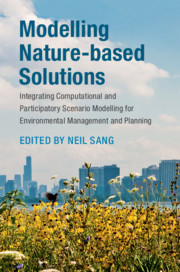 Modelling Nature-based Solutions
Modelling Nature-based Solutions Book contents
- Modelling Nature-based Solutions
- Modelling Nature-based Solutions
- Copyright page
- Contents
- Contributors
- Foreword
- Acknowledgements
- Introduction
- 1 Landscape Modelling and Stakeholder Engagement: Participatory Approaches and Landscape Visualisation
- 2 Agent-based Models of Coupled Social and Natural Systems
- 3 Modelling Nature-based Solutions from Soil Ecosystem Services
- 4 Modelling Water Resources for Nature-based Solutions
- 5 Models at the Service of Marine Nature-based Solutions
- 6 Coastal and Freshwater Flood Models: A Review in the Context of NBS
- 7 Nature-based Solutions to Urban Microclimate Regulation
- 8 Data Mining, Machine Learning and Spatial Data Infrastructures for Scenario Modelling
- 9 Can Geodesign Be Used to Facilitate Boundary Management for Planning and Implementation of Nature-based Solutions?
- 10 Integrating Models into Practice – Recommendations
- Appendix: List of Models/Software
- Index
- Plate Section (PDF Only)
- References
10 - Integrating Models into Practice – Recommendations
Published online by Cambridge University Press: 13 March 2020
- Modelling Nature-based Solutions
- Modelling Nature-based Solutions
- Copyright page
- Contents
- Contributors
- Foreword
- Acknowledgements
- Introduction
- 1 Landscape Modelling and Stakeholder Engagement: Participatory Approaches and Landscape Visualisation
- 2 Agent-based Models of Coupled Social and Natural Systems
- 3 Modelling Nature-based Solutions from Soil Ecosystem Services
- 4 Modelling Water Resources for Nature-based Solutions
- 5 Models at the Service of Marine Nature-based Solutions
- 6 Coastal and Freshwater Flood Models: A Review in the Context of NBS
- 7 Nature-based Solutions to Urban Microclimate Regulation
- 8 Data Mining, Machine Learning and Spatial Data Infrastructures for Scenario Modelling
- 9 Can Geodesign Be Used to Facilitate Boundary Management for Planning and Implementation of Nature-based Solutions?
- 10 Integrating Models into Practice – Recommendations
- Appendix: List of Models/Software
- Index
- Plate Section (PDF Only)
- References
Summary
The solutions must be context-sensitive; for example, even within Sweden it was clear from this survey (Sang & Ode-Sang, 2015) that there was considerable variance in the financial resources, skills and requirements of different local authorities. This said, there are also certain issues in common which we believe will have some general relevance elsewhere, at least in so far as some hierarchy of government exists whereby local government has responsibility for granting or denying permission to specific developments of smaller scale and national authorities are involved in decisions over key infrastructure and strategic planning as well as regulatory and financial frame works. Not all the suggestions will fit equally to all domains, such as land versus marine, but we hope, in bringing together the views of all authors here, to provide some general principles by which greater capacity for scenario modelling may be built. Of course, these represent the views of modellers and academics, albeit ones with considerable collective experience of working with practitioners, policy makers, citizens and other stakeholder groups. Some of these recommendations may be ‘easier said than done’ and few are exclusively the responsibility of any one party, efforts must be coordinated, but we nonetheless believe it is of value to set out as plainly as possible the tasks at hand and where these might be most fruitfully begun.
Information
- Type
- Chapter
- Information
- Modelling Nature-based SolutionsIntegrating Computational and Participatory Scenario Modelling for Environmental Management and Planning, pp. 341 - 351Publisher: Cambridge University PressPrint publication year: 2020